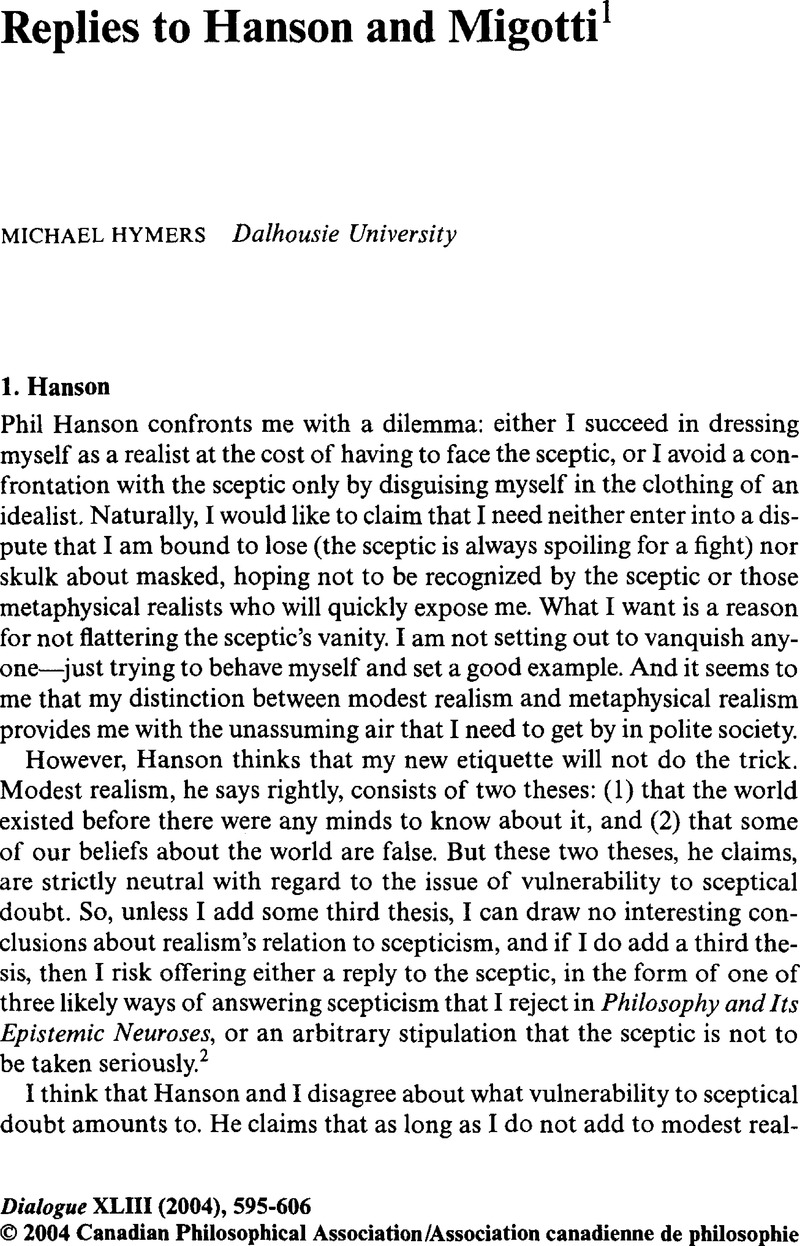No CrossRef data available.
Published online by Cambridge University Press: 13 April 2010

2 For the three kinds of replies to the sceptic that I reject see Philosophy and Its Epistemic Neuroses (Boulder, CO: Westview Press, 2000), p. 21.
3 See Stroud, Barry, The Significance of Philosophical Scepticism (Oxford: Clarendon Press, 1984)CrossRefGoogle Scholar, and Williams, Michael, Unnatural Doubts (Princeton, NJ: Princeton University Press, 1996).Google Scholar
4 McGinn, Colin, “An A Priori Argument for Realism,” The Journal of Philosophy, 76 (1979): 113–33, at p. 115.CrossRefGoogle Scholar
5 Hanson, Philip P., “Idealism, Scepticism, and Internal Relations: Remarks on Hymers's Philosophy and Its Epistemic Neuroses,” Dialogue, 43 (2004): 577–86, p. 578.CrossRefGoogle Scholar
6 Michael Williams makes the same sort of point in the service of describing what he calls the instability of knowledge. See his Unnatural Doubts, chap. 8.
7 Rorty, Richard, Objectivity, Relativism and Truth (New York: Cambridge University Press, 1991), p. 138.Google Scholar
8 Wittgenstein, Ludwig, Philosophical Investigations, 3rd ed., edited by Anscombe, G. E. M. and Rhees, R., translated by Anscombe, G. E. M. (Oxford: Basil Blackwell, 1968), §255.Google Scholar
9 Hanson, “Idealism, Scepticism, and Internal Relations,” p. 592. In this connection, Hanson also wonders how, if I hold that “there is an internal relation between a referring term and its referent” (Philosophy and Its Epistemic Neuroses, p. 52), I can make sense of false existential beliefs. His concern, I take it, is that if (in paradigmatic cases) I must understand what a referring term refers to in order to understand the use of that term, then it will be trivially true that any term I understand refers to something. But the sensible response, it seems to me, is just to point out that in such a case we are not dealing with a referring term. And I can also say of a putatively referring term that fails to refer that, in paradigmatic cases, one understands the use of the term only if one understands what it would refer to, were there no failure of reference.
10 For the same reasons that I am not an idealist, I can draw the distinction, which Hanson suggests I cannot, between discovery in empirical inquiry and creation in mathematics. I think Hanson's worry here is connected with the fourth “cardinal tenet” that Migotti attributes to me: mind and world are internally related. For reasons that I shall return to, I think that both Hanson and Migotti are right to suggest that I have not phrased my point perspicuously inasmuch as I want to allow that the relation between a theoretical term, like “electron” and its referent (and, by extension, between our minds and that posited part of the world) is an external one.
11 Hanson, “Idealism, Scepticism, and Internal Relations,” p. 584.
12 Ibid., p. 9.
13 Wittgenstein, Philosophical Investigations, §201.
14 This point is argued for at length by Baker, G. P. and Hacker, P. M. S. in their Scepticism, Rules and Language (Oxford: Basil Blackwell, 1984).Google Scholar
15 Migotti, Mark, “Discussion of Hymers's Philosophy and Its Epistemic Neuroses,” Dialogue, 43 (2004): 587–94, at p. 588.CrossRefGoogle Scholar
16 Philosophy and Its Epistemic Neuroses, p. 73.
17 Haack, Susan, Evidence and Inquiry (Oxford: Blackwell, 1993).Google Scholar
18 Migotti, “Discussion,” p. 592.
19 But see Migotti, “Discussion,” p. 594, n.2.
20 See Williams's, Unnatural Doubts and his more recent Problems of Knowledge (Oxford: Oxford University Press, 2001)Google Scholar. Haack discusses and rejects a view that she calls contextualism, but it is not the view that Williams presents. See Haack's Evidence and Inquiry, pp. 190–91. As noted earlier, there are various other versions of contextualism due to such writers as Lewis, Cohen, and DeRose; they should not be confused with Williams's view either. My view, at many points, should.
21 Haack, Evidence and Inquiry, pp. 84–86.
22 Ibid., p. 82.